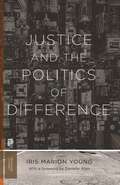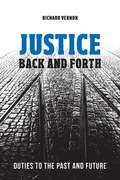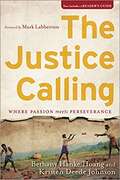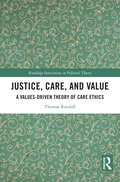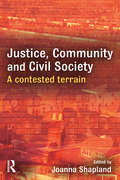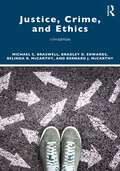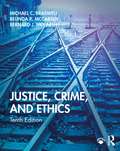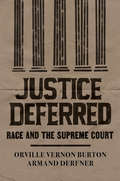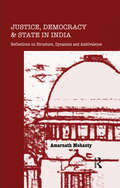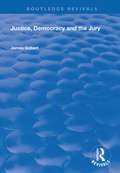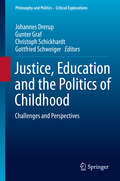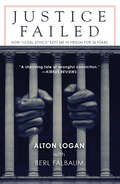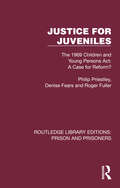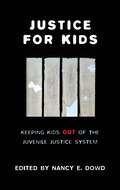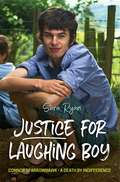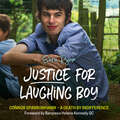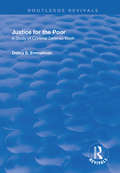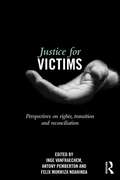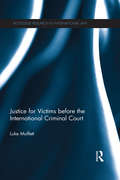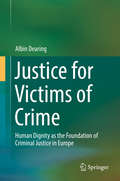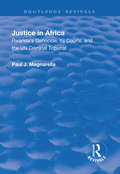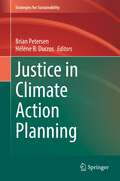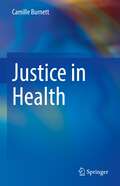- Table View
- List View
Justice and the Politics of Difference (Princeton Classics Ser. #122)
by Iris Marion YoungIn this classic work of feminist political thought, Iris Marion Young challenges the prevailing reduction of social justice to distributive justice. It critically analyzes basic concepts underlying most theories of justice, including impartiality, formal equality, and the unitary moral subjectivity. The starting point for her critique is the experience and concerns of the new social movements about decision making, cultural expression, and division of labor--that were created by marginal and excluded groups, including women, African Americans, and American Indians, as well as gays and lesbians. Iris Young defines concepts of domination and oppression to cover issues eluding the distributive model. Democratic theorists, according to Young do not adequately address the problem of an inclusive participatory framework. By assuming a homogeneous public, they fail to consider institutional arrangements for including people not culturally identified with white European male norms of reason and respectability. Young urges that normative theory and public policy should undermine group-based oppression by affirming rather than suppressing social group difference. Basing her vision of the good society on the differentiated, culturally plural network of contemporary urban life, she argues for a principle of group representation in democratic publics and for group-differentiated policies. Danielle Allen's new foreword contextualizes Young's work and explains how debates surrounding social justice have changed since--and been transformed by--the original publication of Justice and the Politics of Difference.
Justice at a Distance
by Loren E. LomaskyThe current global-justice literature starts from the premise that world poverty is the result of structural injustice mostly attributable to past and present actions of governments and citizens of rich countries. As a result, that literature recommends vast coercive transfers of wealth from rich to poor societies, alongside stronger national and international governance. Justice at a Distance, in contrast, argues that global injustice is largely home-grown and that these native restrictions to freedom lie at the root of poverty and stagnation. The book is the first philosophical work to emphasize free markets in goods, services, and labor as an ethical imperative that allows people to pursue their projects and as the one institutional arrangement capable of alleviating poverty. Supported by a robust economic literature, Justice at a Distance applies the principle of noninterference to the issues of wealth and poverty, immigration, trade, the status of nation-states, war, and aid.
Justice Back and Forth: Duties to the Past and Future
by Richard VernonIdeas of justice have traditionally focused on what individuals owe to one another and have drawn our attention to what is considered fair - what one of us owes to another is justly matched by what the other owes to them. However, what does justice require us to do for past and future generations?In Justice Back and Forth, award-winning author Richard Vernon explores the possibility of justice in cases where time makes reciprocity impossible. This "temporal justice" is examined in ten controversial cases including the duty to return historical artifacts, the ethics and politics of parenting, the punishment of historical offences, the right to procreate, and the imposition of constitutions on future citizens. By deftly weaving together discussions on historical redress and justice for future generations, Vernon reveals that these two opposing topics can in fact be used to illuminate each other. In doing so, he concludes that reciprocity can be adapted to serve intergenerational cases.
The Justice Calling: Where Passion Meets Perseverance
by Bethany Hanke Hoang Kristen Deede Johnson Mark LabbertonJustice requires perseverance--a deep perseverance we can't muster on our own. The world's needs are staggering and even the most passion-driven reactions, strategies, and good intentions can falter. But we serve a God who never falters, who sees the needs, hears the cries, and gives strength--through Jesus Christ and the Holy Spirit--to his people. Offering a comprehensive biblical theology of justice drawn from the whole story of Scripture, this book invites us to know more intimately the God who loves justice and calls us to give our lives to seek the flourishing of others. The authors explore stories of injustice around the globe today and spur Christians to root their passion for justice in the persevering hope of Christ. They also offer practices that can further form us into people who join God's work of setting things right in the world. Now in paper with an added reader's guide.
Justice, Care, and Value: A Values-Driven Theory of Care Ethics (Routledge Innovations in Political Theory)
by Thomas RandallIn Justice, Care, and Value Thomas Randall argues for the radical potential of care ethics as a distinct and preferable theory of distributive justice. Advancing the feminist literature, this book defends a vision of society that can best enable caring relations to flourish. Specifically, Randall proposes a values-driven theory of care ethics that derives normative criteria for evaluating the moral worth of caring relations and their surrounding institutions via a classification of the values of care. They argue that such a theory gives us unique and meaningful solutions to contemporary questions of distributive justice across personal, political, global, and intergenerational domains. In doing so, the book makes significant strides to engage care ethics with the broader moral and political philosophy literature. Topical and interdisciplinary, Randall demonstrates that care ethics has the conceptual resources to ground distributive theories of socialism, territorial and natural resource rights, obligations to future generations, and historic redress. The book will be of great interest to academics, researchers, and students of feminist philosophy, but also of liberalism, political economy, and theories of global and intergenerational justice.
Justice, Community and Civil Society: A Contested Terrain
by Joanna ShaplandOver the last decade there has arisen considerable disquiet about the relationship between criminal justice and its publics. This has been expressed in a variety of different ways, ranging from a concern that state criminal justice has moved too far away from the concerns of ordinary people (become too distant, too out of touch, insufficiently reflective of different groups in society) to the belief that the police have been attending to the wrong priorities, that the state has failed to reduce crime, that people still feel a general sense of insecurity. Governments have sought to respond to these concerns throughout Europe and North America but the results have challenged people's deeply held beliefs about what justice is and what the state's role should be. The need to innovate in response to local demands has hence resulted in some very different initiatives. This book is concerned to delve further into this contested relationship between criminal justice and its publics. Written by experts from different countries as a new initiative in comparative criminal justice, it reveals how different the intrinsic cultural attitudes in relation to criminal justice are across Europe. This is a time when states' monopoly on criminal justice is being questioned and they are being asked on what basis their legitimacy rests, challenged by both globalization and localization. The answers reflect both cultural specificity and, for some, broader moves towards reaching out to citizens and associations representing citizens.
Justice, Crime, and Ethics
by Michael C. Braswell Bradley D. Edwards Belinda R. McCarthy Bernard J. McCarthyJustice, Crime, and Ethics, a leading textbook in criminal justice programs, examines ethical dilemmas pertaining to the administration of criminal justice and professional activities in the field. This 11th edition continues to deliver a broad scope of topics, focusing on law enforcement, legal practice, sentencing, corrections, research, crime control policy, and philosophical issues. The book’s robust coverage encompasses contentious issues such as capital punishment, prison corruption, and the use of deception in police interrogation. The 11th edition includes new material on the impact of social media on crime myths and political misconduct. Law enforcement issues including the George Floyd case and responding to domestic as well as foreign terrorism, including the January 6th insurrection in Washington, DC, are examined. The potential ethical implications of Roe v. Wade being overturned by the Supreme Court are also explored. Emerging issues in corporate misconduct are also discussed including healthcare fraud and corruption as well as crypto-currency fraud. Students of criminal justice, as well as instructors and professionals in the field, continue to rely on this thorough, dependable resource on ethical decision making in the criminal justice system.
Justice, Crime, and Ethics
by Michael C. Braswell Belinda R. McCarthy Bernard J. McCarthyJustice, Crime, and Ethics, a leading textbook in criminal justice programs, examines ethical dilemmas pertaining to the administration of criminal justice and professional activities in the field. This tenth edition continues to deliver a broad scope of topics, focusing on law enforcement, legal practice, sentencing, corrections, research, crime control policy, and philosophical issues. The book’s robust coverage encompasses contentious issues such as capital punishment, prison corruption, and the use of deception in police interrogation. The tenth edition includes new material in a number of chapters including "Learning Police Ethics," "Using Ethical Dilemmas in Training Police," "Prison Corruption," "Crime and Justice Myths," "Corporate Misconduct and Ethics," "Ethics and Criminal Justice Research," and "Ethical Issues in Confronting Terrorism." The use of "Case Studies," "Ethical Dilemmas," and "Policy and Ethics" boxes continues throughout the textbook. A new feature for this edition is the inclusion of "International Perspective" boxes in a number of relevant chapters. Students of criminal justice, as well as instructors and professionals in the field, continue to rely on this thorough, dependable resource on ethical decision making in the criminal justice system.
Justice Deferred: Race and the Supreme Court
by Orville Vernon Burton Armand DerfnerIn the first comprehensive accounting of the U.S. Supreme Court’s race-related jurisprudence, a distinguished historian and renowned civil rights lawyer scrutinize a legacy too often blighted by racial injustice. The Supreme Court is usually seen as protector of our liberties: it ended segregation, was a guarantor of fair trials, and safeguarded free speech and the vote. But this narrative derives mostly from a short period, from the 1930s to the early 1970s. Before then, the Court spent a century largely ignoring or suppressing basic rights, while the fifty years since 1970 have witnessed a mostly accelerating retreat from racial justice. From the Cherokee Trail of Tears to Brown v. Board of Education to the dismantling of the Voting Rights Act, historian Orville Vernon Burton and civil rights lawyer Armand Derfner shine a powerful light on the Court’s race record—a legacy at times uplifting, but more often distressing and sometimes disgraceful. For nearly a century, the Court ensured that the nineteenth-century Reconstruction amendments would not truly free and enfranchise African Americans. And the twenty-first century has seen a steady erosion of commitments to enforcing hard-won rights. Justice Deferred is the first book that comprehensively charts the Court’s race jurisprudence. Addressing nearly two hundred cases involving America’s racial minorities, the authors probe the parties involved, the justices’ reasoning, and the impact of individual rulings. We learn of heroes such as Thurgood Marshall; villains, including Roger Taney; and enigmas like Oliver Wendell Holmes and Hugo Black. Much of the fragility of civil rights in America is due to the Supreme Court, but as this sweeping history also reminds us, the justices still have the power to make good on the country’s promise of equal rights for all.
Justice, Democracy and State in India: Reflections on Structure, Dynamics and Ambivalence
by Amarnath MohantyThis book explores how the liberal conception of justice with all its ideological underpinnings is reflected in the framing and working of the Constitution of India, in the adoption of broader socio-economic objectives, in the functioning of judicial and state institutions, and in the formulation and implementation of development strategy. It analyses the dynamics of the relationship between justice, democracy and the state. The book studies the liberal conception of social justice and its sufficiency, and interrogates its performance and adequacy within the structural parameters and cultural conditions of postcolonial India. It provides an analytical exposition of how the borrowed and inadequate conception of liberal justice and democracy inherited from colonial past, and the espousal of the derivative developmental pattern based on modernist and constructivist paradigm, have together failed to achieve the modest target of justice enshrined in the Constitution. Interlinking justice, democracy and state, the book examines their operational dynamics in an integrated framework which has relevance for other Third World countries also because of socio-economic and cultural commonalites.
Justice, Democracy and the Jury (Routledge Revivals)
by James GobertFirst published in 1997, this volume recognises that on trial in every criminal case heard by a jury is not only the defendant but the democratic premise that ordinary citizens are capable of sitting in judgement on that defendant. The jury is a quintessential democratic institution, the lay cog in a criminal justice machine dominated by lawyers, judges and police. Today, however, the jury finds itself under attack – on the right, for perverse verdicts, and, on the left, for miscarriages of justice. Justice, Democracy and the Jury is an attempt to place the jury within a historical, political and philosophical framework, and to analyse the decision-making processes at work on a jury. The book also examines whether the model of the jury can be adapted to other decision-making contexts and whether "citizens juries" can be used to revive a flagging democracy and to empower the people on issues of public concern.
Justice, Education and the Politics of Childhood
by Johannes Drerup Gunter Graf Christoph Schickhardt Gottfried SchweigerThis volume contributes to the ongoing interdisciplinary controversies about the moral, legal and political status of children and childhood. It comprises essays by scholars from different disciplinary backgrounds on diverse theoretical problems and public policy controversies that bear upon different facets of the life of children in contemporary liberal democracies. The book is divided into three major parts that are each organized around a common general theme. The first part ("Children and Childhood: Autonomy, Well-Being and Paternalism") focusses on key concepts of an ethics of childhood. Part two ("Justice for Children") contains chapters that are concerned with the topics of justice for children and justice during childhood. The third part ("The Politics of Childhood") deals with issues that concern the importance of `childhood´ as a historically contingent political category and its relevance for the justification and practical design of political processes and institutions that affect children and families.
Justice Failed: How "Legal Ethics" Kept Me in Prison for 26 Years
by Alton Logan Berl Falbaum“A shocking tale of wrongful conviction . . . that brings general conditions into cruelly sharp focus.” —Kirkus ReviewsJustice Failed is the story of Alton Logan, an African American man who served twenty–six years in prison for a murder he did not commit. In 1983, Logan was falsely convicted of fatally shooting an off–duty Cook County corrections officer, Lloyd M. Wickliffe, at a Chicago–area McDonald’s, and sentenced to life in prison. While serving time for unrelated charges, Andrew Wilson—the true murderer—admitted his guilt to his own lawyers, Dale Coventry and Jamie Kunz. However, bound by the legal code of ethics known as the absolutism of client–attorney privilege, Coventry and Kunz could not take action. Instead, they signed an affidavit proclaiming Logan’s innocence and locked the document in a hidden strong box. It wasn’t until after Wilson’s death in 2007 that his lawyers were able to come forward with the evidence that would eventually set Alton Logan free after twenty–six years in prison.Written in collaboration with veteran journalist Berl Falbaum, Justice Failed explores the sharp divide that exists between commonsense morality—an innocent man should be free—and the rigid ethics of the law that superseded that morality. Throughout the book, in–depth interviews and legal analyses give way to Alton Logan himself as he tells his own story, from his childhood in Chicago to the devastating impact that the loss of a quarter century has had on his life—he entered prison at twenty–eight years of age, and was released at fifty–five.
Justice for Juveniles: The 1969 Children and Young Persons Act: A Case for Reform? (Routledge Library Editions: Prison and Prisoners)
by Philip Priestley Denise Fears Roger FullerThe working of the 1969 Children and Young Persons Act was the subject of much debate in the 1970s. Discussion had been strong on opinion and short on facts; this book, originally published in 1977, supplied some much-needed evidence, based on the results of a research project funded by the Home Office Research Unit. It also discusses the origins of the Act and its consequences for children and their families. The authors describe the way in which two groups of children were dealt with by the police, social workers, probation officers and juvenile courts during the first three months of 1972. Their findings depict a system which decides what to do with ‘children in trouble’ mainly on the basis of their offence behaviour rather than on assessments of their personal needs – a ‘judicial’ rather than ‘welfare’ system of the kind envisaged in the legislation. As a result of these observations, the authors conclude that ‘the idea of the juvenile court has been tried and found wanting, and that it suffers from the congenital defects which fresh applications of money or manpower will fail to cure.’ They recommend the abolition of the juvenile court and the raising of the age of criminal responsibility, proposing a number of controversial alternatives based on principles of non-intervention.
Justice for Kids: Keeping Kids Out of the Juvenile Justice System (Families, Law, and Society #2)
by Nancy E. DowdChildren and youth become involved with the juvenile justice system at a significant rate. While some children move just as quickly out of the system and go on to live productive lives as adults, other children become enmeshed in the system, developing deeper problems and or transferring into the adult criminal justice system. Justice for Kids is a volume of work by leading academics and activists that focuses on ways to intervene at the earliest possible point to rehabilitate and redirect--to keep kids out of the system--rather than to punish and drive kids deeper. Justice for Kids presents a compelling argument for rethinking and restructuring the juvenile justice system as we know it. This unique collection explores the system's fault lines with respect to all children, and focuses in particular on issues of race, gender, and sexual orientation that skew the system. Most importantly, it provides specific program initiatives that offer alternatives to our thinking about prevention and deterrence, with an ultimate focus on keeping kids out of the system altogether.
Justice for Laughing Boy: Connor Sparrowhawk - A Death by Indifference
by Sara RyanOn July 4th 2013, Connor Sparrowhawk, also known as Laughing Boy or LB, was found dead in a specialist NHS unit. Connor, who had autism and epilepsy, had a seizure while in the bath and no member of staff was on hand to stop him from drowning. An entirely preventable death. Connor's mother Sara Ryan tells the touching story of her remarkable son's early life, then premature death. She articulates the harrowing experience of not only losing a child, but then having to fight to discover the truth about the circumstances of his death. Following Connor's death, Sara and others start the dynamic #JusticeforLB campaign to highlight the injustice of Connor's death. It quickly gains momentum and becomes a rallying cry not only for Connor, but for the many other injustices learning disabled adults experience, leading to high-profile inquiries which uncover shocking rates of premature death among this group. Justice for Laughing Boy tells a very uncomfortable truth about the experiences of people with learning disabilities in inpatient settings today. It serves as a wake-up call to all of us and asks: can we really claim that we respect the life and dignity of learning disabled people?
Justice for Laughing Boy: Connor Sparrowhawk - A Death by Indifference
by Sara RyanA mother's memoir which tells the story of her son's premature death while in NHS care, and her subsequent campaign for justice and for the rights of people with learning disabilities.On July 4th 2013, Connor Sparrowhawk, also known as Laughing Boy or LB, was found dead in a specialist NHS unit. Connor, who had autism and epilepsy, had a seizure while in the bath and no member of staff was on hand to stop him from drowning. An entirely preventable death.Sara Ryan presents a frank, sometimes funny and touching account of her son's early life and preventable death and the unfolding #JusticeforLB campaign. This serves as a wake-up call to all of us and asks: can we really claim that we respect the life and dignity of learning disabled people?(P) 2021 Jessica Kingsley Publishers
Justice for the Poor: A Study of Criminal Defence Work
by Debra S. EmmelmanThis title was first published in 2003. In this study, the author examines the behavior of one group of court-appointed defence attorneys and reaches the conclusion that although, in contrast to popular opinion, these attorneys maintain an adversarial stance against the prosecutors and behave in a legally ethical (or "procedurally just") manner, case outcomes are unduly shaped by social class and are therefore substantively unjust. This occurs because poor defendants typically lack cultural rhetoric that favourably influences those who construct and operate the criminal court system. Ironically, this indicates that, in many cases, the process of plea bargaining may be more substantively just than trials. A major contribution of the study is the detailed analysis of the manner by which oppression and substantive injustice occur in the adjudication of many cases and how the cultural practices of the powerful can frequently misconstrue, exclude and mute the voices of the poor.
Justice for Victims: Perspectives on rights, transition and reconciliation
by Inge Vanfraechem Antony Pemberton Felix Mukwiza Ndahinda Ivo Aertsen Victor Jammers Sonja Leferink Rianne Letschert Stephan ParmentierJustice for Victims brings together the world’s leading scholars in the fields of study surrounding victimization in a pioneering international collection. This book focuses on the current study of victims of crime, combining both legal and social-scientific perspectives, articulating both in new directions and questioning whether victims really do have more rights in our modern world. This book offers an interdisciplinary approach, covering large-scale (political) victimization, terrorist victimization, sexual victimization and routine victimization. Split into three sections, this book provides in-depth coverage of: victims' rights, transitional justice and victims' perspectives, and trauma, resilience and justice. Victims' rights are conceptualised in the human rights framework and discussed in relation to supranational, international and regional policies. The transitional justice section covers victims of war from those caught between peace and justice, as well as post-conflict justice. The final section focuses on post-traumatic stress, connecting psychological and anthropological perceptions in analysing collective violence, mass victimization and trauma. This book addresses challenging and new issues in the field of victimology and the study of transitional and restorative justice. As such, it will be of interest to researchers, practitioners and students interested in the fields of victimology, transitional justice, restorative justice and trauma work.
Justice for Victims before the International Criminal Court (Routledge Research in International Law)
by Luke MoffettMany prosecutors and commentators have praised the victim provisions at the International Criminal Court (ICC) as 'justice for victims', which for the first time include participation, protection and reparations. This book critically examines the role of victims in international criminal justice, drawing from human rights, victimology, and best practices in transitional justice. Drawing on field research in Northern Uganda, Luke Moffet explores the nature of international crimes and assesses the role of victims in the proceedings of the ICC, paying particular attention to their recognition, participation, reparations and protection. The book argues that because of the criminal nature and structural limitations of the ICC, justice for victims is symbolic, requiring State Parties to complement the work of the Court to address victims' needs. In advancing an innovative theory of justice for victims, and in offering solutions to current challenges, the book will be of great interest and use to academics, practitioners and students engaged in victimology, the ICC, transitional justice, or reparations.
Justice for Victims of Crime
by Albin DearingThis book analyses the rights of crime victims within a human rights paradigm, and describes the inconsistencies resulting from attempts to introduce the procedural rights of victims within a criminal justice system that views crime as a matter between the state and the offender, and not as one involving the victim. To remedy this problem, the book calls for abandoning the concept of crime as an infringement of a state's criminal laws and instead reinterpreting it as a violation of human rights. The state's right to punish the offender would then be replaced by the rights of victims to see those responsible for violating their human rights convicted and punished and by the rights of offenders to be treated as accountable agents.
Justice in Africa: Rwanda's Genocide, Its Courts and the UN Criminal Tribunal (Routledge Revivals)
by Paul J MagnarellaThis title was first published in 2000: This work describes the United Nations International Criminal Tribunal for Rwanda (ICTR) - the first international court created to try persons for genocide and violation the humanitarian law of non-international armed conflict. The book begins with an explanation of the causes of the 1994 genocide in Rwanda. It then discusses the UN Security Council's creation of the ICTR and the Tribunal's organization, functioning, accomplishments and shortcomings. The author explains how the Tribunal has gained custody over suspects who had fled to other countries in Africa, Europe and also to the USA. The book analyzes the ICTR's first several cases and describes the unique contributions the Tribunal is making to the expansion of humanitarian law. In addition, the author describes Rwanda's own legal attempts to deal with the trauma of 1994 by passing a new genocide statute and creating special genocide courts. He also explains the similiarities and differences between the Tribunal for Rwanda and the one created by the UN Security Council to deal with major crimes committed during the break-up of former Yugoslavia.
Justice in America: The Separate Realities of Blacks and Whites
by Mark Peffley Jon HurwitzAs reactions to the O. J. Simpson verdict, the Rodney King beating, and the Amadou Diallo killing make clear, whites and African Americans in the United States inhabit two different perceptual worlds, with the former seeing the justice system as largely fair and color blind and the latter believing it to be replete with bias and discrimination. The authors tackle two important questions in this book: what explains the widely differing perceptions, and why do such differences matter? They attribute much of the racial chasm to the relatively common personal confrontations that many blacks have with law enforcement - confrontations seldom experienced by whites. More importantly, the authors demonstrate that this racial chasm is consequential: it leads African Americans to react much more cynically to incidents of police brutality and racial profiling, and also to be far more skeptical of punitive anti-crime policies ranging from the death penalty to three-strikes laws.
Justice in Climate Action Planning (Strategies for Sustainability)
by Brian Petersen Hélène B. DucrosThis edited volume examines how climate action plans engage justice at the scale of the city. Recent events in the United States make the context particularly ripe for a discussion of justice in urban climate politics. On the one hand, the emergence of the Black Lives Matter movement, George Floyd’s death, and the prominence of racial discrimination in the public realm have mainstreamed the notion of justice. On the other hand, the dire consequences of increased frequency and severity of climate events on vulnerable segments of urban populations are undeniable. While some cities have been proactive about integrating justice in their climate action planning, in most places an explicit and systematic link between both spheres has been lacking. This book explores this interface as it seeks to understand how cities can respond to climate change in a just way and for just outcomes. While resilience strategies based on “development” may engage historic inequities, they may at the same time result in marginalizing certain populations through various processes, from mismatched solutions to outright exclusion and climate gentrification. By identifying how certain populations are included in or excluded from climate action planning practices, the chapters in this volume draw on case studies to outline the differential outcomes of climate action in American cities, also proposing a template for comparative work beyond the US. The authors tackle the debate about how justice is or is not integrated in climate action plans and assess practical implications, while also making theoretical and methodological contributions. As it fills a gap in the literature at the intersection of justice and climate action, the book produces new insights for a wide-ranging audience: students, practitioners, policy-makers, planners, the non-profit sector, and scholars in geography, urban planning, urban studies, environmental studies, ecology, political science, or anthropology. Along five axes of investigation―theory, resilience, equity, community, and comparison as method―the contributors offer various pathways into the intersection between urban climate action and different understandings of justice. Collectively, they invite a reflection that can lead to practical initiatives in climate mitigation, while also advancing the theorization of social justice to account for the urban as a node where (in)justice plays out and can be addressed with significant results.
Justice in Health
by Camille BurnettInequities and health disparities are the greatest and most pressing social issues of our time. This book explores public health practice through the critical lens of social and structural justice by examining our approach to health and what it means to be healthy, systemically and structurally.Through recent events, the raw reality of health disparities and inequities have been exposed. These events are earmarked by COVID-19's decimating and disparate impacts on Black and Brown populations during one of the greatest social movements of our time to end racism. Since this very public explosion of intersecting forms of oppression and inequitable suffrage, many have clamored to make sense of it, to reframe our narratives toward action, and re-envision what progress and change could look like. This text is positioned as a tool to help professionals dismantle old ways of thinking while reconstructing new ones that can be more responsive in meeting the realities of today.The author challenges the reader to think about public health more deeply and pragmatically as the space for reconciling solutions to these poignant health issues. This requires the exploration of an ideological shift in how we think of health, how we prepare healthcare providers outside of an antiquated sick care system, and how we prioritize the determinants of health across a re-imagined continuum of care. The scope of this book ranges from a historical and structural examination of our beliefs about health to perceiving a more just system of care where health is intentionally co-created toward this aim. It intentionally explores health along the lines of equity and through the broader lens of the social determinants of health to shed light on the opportunity in this moment that public health creates for health care.Justice in Health is a timely and important resource for healthcare professionals (pre- and post-licensure) and healthcare decision-makers. The book also appeals more widely to instructors, academics, researchers, and students across disciplines of nursing, medicine, public heath, sociology, and social work.
